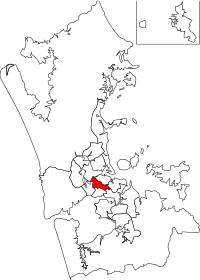Albert-Eden Local Board
| Local Board of Auckland Council | |
|
Location of Albert-Eden in Auckland | |
| Formation | 2010 |
|---|---|
| Coordinates | 36°52′22″S 174°45′07″E / 36.872813°S 174.751810°ECoordinates: 36°52′22″S 174°45′07″E / 36.872813°S 174.751810°E |
Chair | Peter Haynes (CV) |
Deputy Chair | Glenda Fryer (CV) |
Political groups | |
Ward | Albert-Eden-Roskill |
Budget | NZ$32,925,000 |
The Albert-Eden Local Board is one of the 21 local boards of the Auckland Council.
The Albert-Eden board, named after the two volcanic cones in the board area: Mount Albert and Mount Eden, covers the suburbs of Balmoral, Epsom, Greenlane, Kingsland, Morningside, Mount Albert, Mount Eden, Owairaka, Point Chevalier, Sandringham, and Waterview.[1] The total population residing in the Albert-Eden Local Board area, as of the June 2016 was 106,600.[2]
The board is governed by eight board members elected from two subdivisions: four from the Owairaka subdivision (western half of the board area), and four from the Maungawhau subdivision (eastern half).[1] The first board members were elected with the nationwide local elections on Saturday 9 October 2010; the local board's second election closed on 12 October 2013.
Population
As of 2013, Albert-Eden has a total population of 94,695, with an average age of 34. It has a Māori population of 6,108, with an average age of 27.3 The area has a total of 34,134 dwellings. The population is 63.2% European, 6.8% Māori, 7.8% Pacific and 28.2% Asian. 2.1% of the population is Middle Eastern, Latin American and African, and 1.2% is part of another ethnic groups. 38.4% percent of the population was born overseas.[3]
The median income of Albert-Eden residents is $32,800, and 90.2% of the population has formal qualifications. 55.5% of households own their own home, and 86.1% have access to the internet. The median rent is $370 per household.[3]
Economy
As of 2013, 21% of people are employed in healthcare and social assistance, making it the largest source of employment in the local board area. 13% of people are employed in education and training, 13% are in professional, scientific and technical service roles, and 12% are in the retail trade. 8% of Albert-Eden residents work in accommodation and food services.[3]
References
- 1 2 "Albert-Eden local board and subdivisions map" (PDF). Retrieved 2010-07-23.
- ↑ "Subnational Population Estimates: At 30 June 2016 (provisional)". Statistics New Zealand. 21 October 2016. Retrieved 21 October 2016. For urban areas, "Subnational population estimates (UA, AU), by age and sex, at 30 June 1996, 2001, 2006-16 (2017 boundary)". Statistics New Zealand. 21 October 2016. Retrieved 21 October 2016.
- 1 2 3 "QuickStats about Albert-Eden Local Board Area" (PDF). New Zealand Census. Statistics New Zealand. Retrieved 10 May 2015.
